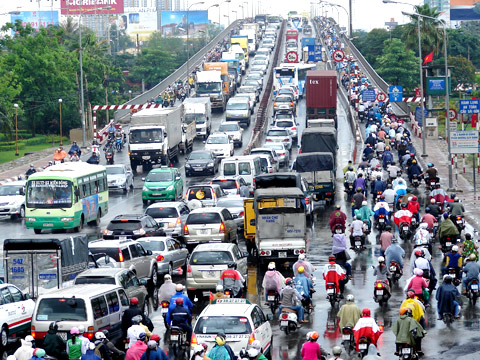|
Traffic congestion, along with flooding,
is a serious problem in

Environmental pollution, traffic congestion,
immigration are also big problems that are challenging the development of big
cities in
All of these challenges show the backwardness of
These problems and challenges faced by big cities
were discussed at the international conference "Opportunities and
challenges for sustainable urban development" held on September 15 in
HCM City, with the participation of 71 scholars from Japan, France, Malaysia,
the Philippines, Nepal, Laos and Vietnam. The conference was one of the
largest on urban development issues held in
Traffic jams and flooding
Speaking on the sidelines of the workshop, Prof. Nguyen
Minh Hoa, head of the Urban Studies Faculty of the HCM City University of
Social Sciences and Humanities, said: "Every city in the world undergoes
certain stages of development and has to face different challenges. In
Vietnam today, specifically Ho Chi Minh City, the biggest challenges are
traffic jams and pollution - the problems that other cities in the region
settled 15-20 years ago, even 30 years ago. For many reasons, the most
notable one is that we do not learn from the experience of other
countries."
In his presentation, Mr. Hoa said: "Currently, the
total surface area for traffic in
Prof. Hidefumi Imura, a Japanese expert on urban
development and ecological sustainability from
The question was whether there is sufficient
infrastructure to ensure no flooding, and whether the funding will increase
compared to the original estimates.
"For cities with a population of millions, the
construction of transport systems such as a metro system is inevitable. Only
in cities with a small population like those in
"Twenty years ago, when I worked with experts in
Bangkok and Shanghai, they all said that the construction of the metro system
in these cities is completely impossible, especially in Bangkok, where the
ground is low and flooding is frequent. But now they all have very modern and
convenient metro systems. It all stems from a sense that the urban transport
system of high quality will bring many benefits,” he added.
However, he also noted that the development of the
metro system should also preserve the cultural and historical values as well
as the environment of the city.
Potential for "smart
cities"
Several experts proposed a new direction for developing
cities like
Dr. Masahiko Nakanishi of
Prof. Imura Hidefuma also said: "I noticed that
Thu Ly,
|
Thứ Tư, 17 tháng 9, 2014
Đăng ký:
Đăng Nhận xét (Atom)
Không có nhận xét nào:
Đăng nhận xét